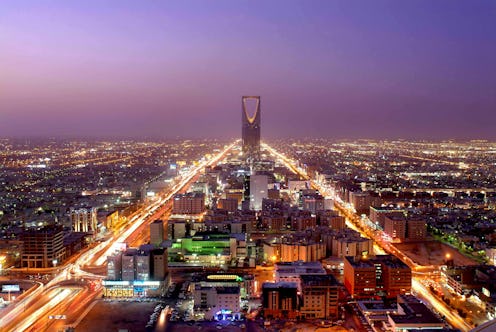News
An Inspiring Art Project By Saudi Arabian Women
Three female artists from Saudi Arabia launched a daring "Art Is Halal" poster campaign designed to get people talking about the limitations on freedom of expression in the majority Sunni Muslim Kingdom. More than 400 posters declaring “Art Is Halal” have been pasted across the Saudi capital of Riyadh, Middle East Eye reports. The birthplace of Islam is regulated by an unforgiving legal code and is notoriously conservative — but the poster campaign comes at a time when the progressive Saudi art scene is arguably gaining ground against the odds.
“The expression ‘art is halal’ was chosen with the aim of urging the viewer and public at large to ask questions, and even to denounce and criticise [the slogan],” Ayesha al-Barqi, one of the women responsible for the project, told news site al-Balad (as translated by Middle East Eye). Al-Barqi and her collaborators Boshra al-Ouda and Majd al-Harbi are students at Princess Noura bint Abdulrahman University in Riyadh — a recently completed campus housing the largest women’s university in the world.
Halal is an Arabic word meaning "permissible" — identifying what is acceptable according to Quranic law. Al-Barqi told al-Balad:
We want people to have a discussion about the concept of art and to look deeper into its meaning the limits of "halal" and "haram." We are not men of religion who can issue legal judgements and fatwas, but we dealt with the issue from an artistic perspective... The posters are just part of the campaign. What the public does and how they react to it will become part of the project.
Applying the word halal to art in the Saudi Arabian context is somewhat audacious, given that the country has a remarkably rich history of art censorship. The project is rendered even more daring, perhaps, by the identity of its organizers. In a country where imagery of women is frequently blanked out and female citizens live under increasingly harsh restrictions, al-Barqi, al-Ouda, and al-Harbi are taking to the streets, pasting the contentious posters across Riyadh, and documenting themselves while they’re at it.
The photographs of their exploits have been splashed across social media, and have generated a hashtag that is seeing plenty of (Arabic-language) traffic. Middle East Eye translates several of these tweets, which evidence a divided response: “Photography is art, drawing is art, singing is art, dancing is art #ArtIsHalal” writes @dafshona, while @e_alosimi is less congratulatory: “Where is the art in distributing leaflets!! It’s random and a distortion, as well as an assault on the property of others, which they are using to spread their campaign! #ArtIsHalal.”
The latter quote may be a rebuke to politicized public art, but the practice is by no means a foreign concept to Saudi citizens. In 2012, graffiti artist and graphic design graduate Sarah Mohanna Al Abdali took her feelings about the overdevelopment of Mecca to the city’s streets. “I didn't want it to be a beautiful artwork, I wanted to create debate,” she told CNN, of her spray-painted works.
The next year, artist and garbage collector Omamah Ghassan Alsadiq embarked on a project — starting in Saudi Arabia — to cover the world’s walls with 300 painted and stenciled camels. The project quickly spread across the globe. “It’s been a kind of proof that young Saudi women — whether artists, lawyers, doctors, teachers, designers, or anything else — can stand out and do things,” Alsadiq told Mashallah News.
And although Saudi women are still unable to vote, there are suggestions that female artists in the kingdom are managing to overcome the limitations imposed on them, to international applause. As The Telegraph reports, two sisters from Mecca were chosen to represent the country at the 2011 Venice Biennale, and in 2012, Riyadh saw the inception of a new arts center powered by women. The founder, creative director, and chief curator of Alāan Artspace are all female. “Alāan’s name — which means ‘now’ in Arabic — reflects the energy of the art scene in Saudi Arabia, and the feeling in Riyadh that spaces like ours have been long overdue,” Director Neama Alsudairy told Re-orient Magazine, at the time of the opening.
Nevertheless, the kingdom, ruled by the Al Saud family, is far from an artistic utopia in terms of freedom of expression. Associated with the Wahhabi religious establishment (a severe form of Islam), the Saudi regime has a notoriously harsh penal code, and the government tends to hold a tight rein on cultural expression in the public sphere. “A lot of cultural events are organized by the government, and the government puts a lot of restrictions on what can be done," an unnamed Saudi blogger told CNN in 2012. That same year, another blogger, Raif Badawi, was sentenced to 10 years in prison and a thousand lashes for setting up a website promoting freedom of expression. He was charged with insulting Islam.
Currently, the Saudi Art Council is holding an exhibition to examine the kingdom’s contemporary arts scene. Called “Fast Forward,” the show contains works dating from the 1960s and will be open in Jeddah through April 22. Last year Amine Kabbaj, director of the Marrakesh Biennale, expressed enthusiasm and hope for the country’s burgeoning arts scene. “We are seeing art being displayed more frequently in Saudi Arabia," Kabbaj told BBC. “The number of people who are interested is a clear indication that there is an appetite for art. The Kingdom is opening up gradually through culture.”
And Nasreen Raja, a U.K.-based Saudi artist, assured Middle East Eye that the art boom has not been confined to galleries — in fact, socially conscious street art in the style of the “Art Is Halal” project, is, she said, “something of a trend right now.” Let’s hope it keeps on trending.
Images: Getty Images (1)
